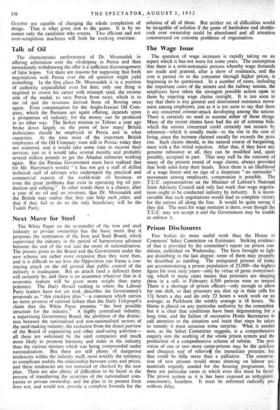The Wage Issue
The question of wage increases is rapidly taking on an aspect which it has-not worn for some years. The assumption that there is a semi-automatic process whereby wage demands are made and granted, after a show of resistance, and the cost is passed on to the consumer through higher prices, is beginning to be questioned. In a number of cases, including the important cases of the miners and the railway unions, the employers have taken the strongest possible action open to them- by rejecting wage claims outright. It is too soon to say that there is any general and determined resistance move- ment among employers, just as it is too soon to say that there is any concerted counter-attack developing among the unions. There is certainly no need to assume either of these things. Many of the recent claims have had the air of extreme bids, which the unions concerned could certainly net sustain by reference—which is usually made—to the rise in the cost of living, since the increase claimed usually far exceeds the price rise. Such claims should, in the natural course of bargaining, meet with a flat initial rejection. After that, if they have any genuine substance at all, they can be modified and, quite possibly, accepted in part. That may well be the outcome of many of the present round of wage claims, always provided that both sides keep their heads. Since there is no likelihood of a wage freeze and no sign of a desperate " no surrender " movement among employers, compromise is possible. The T.U.C. representatives on the Minister of Labour's National Joint Advisory Council said only last week that wage negotia- tions ought to be conducted industry by industry. It is incon- ceivable that such negotiations would lead to complete victory for the unions all along the line. It would be quite wrong if they did. The need for wage restraint is there, even though the T.U.C. may not accept it and the Government may be unable to enforce it.


























 Previous page
Previous page